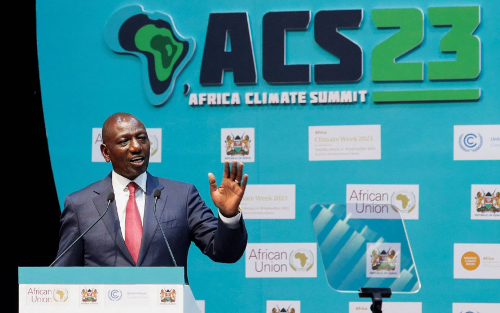Kenya plans to settle $300m of $2bn Eurobond debt in December

Kenya is set to repay $300 million of a $2 billion Eurobond in December, which is scheduled to mature in June next year, according to President William Ruto. The management of this Eurobond is being closely monitored due to concerns about Kenya's growing debt repayments, a weakening currency, and rising yields that have made it challenging for many frontier economies to access global markets.
President Ruto addressed the issue in his State of the Nation address to parliament, expressing confidence that Kenya will fulfill its debt obligations. The country's government is currently allocating approximately half of its revenue to debt servicing, putting pressure on public finances.
The announcement comes after Kenya sought financing from multilateral institutions including the World Bank and syndicated loans from lenders. The successful repayment of the Eurobond will be a key development in Kenya's efforts to manage its debt situation and maintain financial stability.
Key Takeaways
The announcement of Kenya's decision to buy back $300 million of its $2 billion Eurobond led to a temporary decrease in yields on benchmark Kenyan government bonds, though they later edged back up. While the buyback is considered a positive move, especially given the substantial size of the maturity, there are concerns that if the buyback is executed below par value, it could potentially lead to a rating downgrade. Kenya's escalating debt burden has become a significant concern for investors, particularly as the country grapples with soaring energy and food import bills, coupled with foreign exchange reserves standing at a modest $6.84 billion. As of June 2023, public debt, in present value terms, reached 64.4% of its gross domestic product (GDP), exceeding the stipulated ceiling of 60%, as reported by the National Treasury. Investor unease has heightened, particularly regarding how Kenya will manage the buyback of its debt amid dollar shortages. Warnings from credit rating agencies such as Moody's Investors Service and S&P Global Ratings suggest that any redemption below par value could be considered a default. Fitch Ratings further cautioned on Tuesday that it might downgrade Kenya's credit rating based on the extent to which the nation utilizes its foreign reserves to settle Eurobond payments. These dynamics underscore the challenges Kenya faces in managing its debt situation and maintaining financial stability.

Next Frontier
Stay up to date on major news and events in African markets. Delivered weekly.
Pulse54
UDeep-dives into what’s old and new in Africa’s investment landscape. Delivered twice monthly.
Events
Sign up to stay informed about our regular webinars, product launches, and exhibitions.




